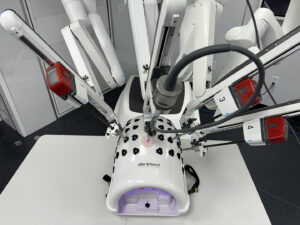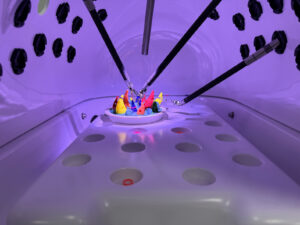



BY WILLIAM KALLUS, GUEST WRITER TO THE TIMES
ORLANDO – For most of his life Will Rogers has loved playing the trombone. But being a musician and the threat of not playing again is not something easy to accept. A screening at Orlando Health Dr. Phillips Hospital found that he had stage one lung cancer and eventually he needed surgery. “My fear was that I was never going to play my horn again in my entire life,” said Will Rogers, former Orlando Health Cancer Institute patient.
Recently Orlando Health Cancer Institute showcased the advanced robotic tools that’s helped Rogers and many other patients like him.
To detect one of the leading causes of cancer, a lung biopsy system helps physicians reach further into the lungs to detect lesions and obtain tissue samples. This minimally invasive procedure helps oncologists diagnose lung cancer sooner, which improves survival rates.
The system uses an ultra-thin articulating robotic catheter that can move 180-degrees in all directions, which enables physicians to navigate through small, tortuous airways within the lungs.
Throughout the navigation and biopsy process, the system’s fiber optic shape sensor technology provides the physician with the precise location and shape information of the catheter. In addition, the system easily integrates with existing lung-nodule biopsy systems and imaging technology, including fluoroscopy, ultrasound, and CT.
For surgery, a robotic system is used that has a patient side cart with robotic arms, a vision cart supporting a 3D HD vision system and a console that provides the surgeon in control with an immersive experience. This system enables precision and accuracy for soft tissue procedures along with powerful vision tools for surgeons to see the body.
“New technology is making it possible for us to safely access parts of the lungs that are difficult to reach to see and diagnose cancer earlier than ever,” says Dr. Ali Jiwani, Interventional Pulmonologist, Orlando Health Cancer Institute. “Early screenings and detection of lung cancer is critical to survival. These tools along with the world-class care we provide at the Orlando Health Cancer Institute will ensure patients receive the care they need – from an accurate diagnosis to the best possible treatment.”
This new technology gives patients a safer experience and allows them to return to normal activities sooner than ever before. The goal is to improve survival odds by finding the disease sooner.
“A lot of people are concerned about getting a mammography, a colonoscopy, or a prostate exam. But lung cancer screenings are not top of mind,” said Dr. Luis Herrera, Thoracic Surgery, Orlando Health Cancer Institute. “Lung cancer is a prevalent disease. It is important to stay vigilant and if you are at high risk, you should get screened.”
While 80 percent of the lung cancer patients Orlando Health sees have a history of smoking, the other 20 percent have never smoked cigarettes or used any form of tobacco in their lives. Some of the culprits are secondhand smoke and radon gas.
Screening and Early Detection
Lung cancer is the leading cause of death from cancer in both men and women in the United States. At least 8.6 million Americans are at high risk for developing lung cancer and should be screened annually, according to the American Lung Association.
Studies have shown that a low-dose CT scan is the only lung cancer screening tool that reduces your risk of dying from lung cancer. That’s because symptoms of lung cancer usually don’t appear until the disease is already at an advanced stage. Even when lung cancer does cause symptoms, many people may mistake them for other problems, such as an infection or the long-term effects from smoking. This may delay the diagnosis.
A low-dose CT scan shows changes in your lungs, which will prompt your doctor to order a test to determine if you have lung cancer. Your actual diagnosis of lung cancer is made by looking at your lung cells in a lab. If you need a lung cancer test, your doctor will decide which test is appropriate for you.
Should You Be Screened?
You should be screened for lung cancer if you meet ALL these conditions:
- Are between 50 and 80 years old
- Have a 20 pack-year smoking history, which is calculated by multiplying the number of packs of cigarettes smoked a day by the number of years you have smoked
- Currently smoke or quit within the past 15 years
Rogers, who has now recovered from his bout with lung cancer says the gift he was born with is the best gift he can now give to the community that helped him. “The way I can help myself and the way I can help other people is by sharing my music. I’m sharing it through the medical industry based on what they have given me, which is my life back.”






